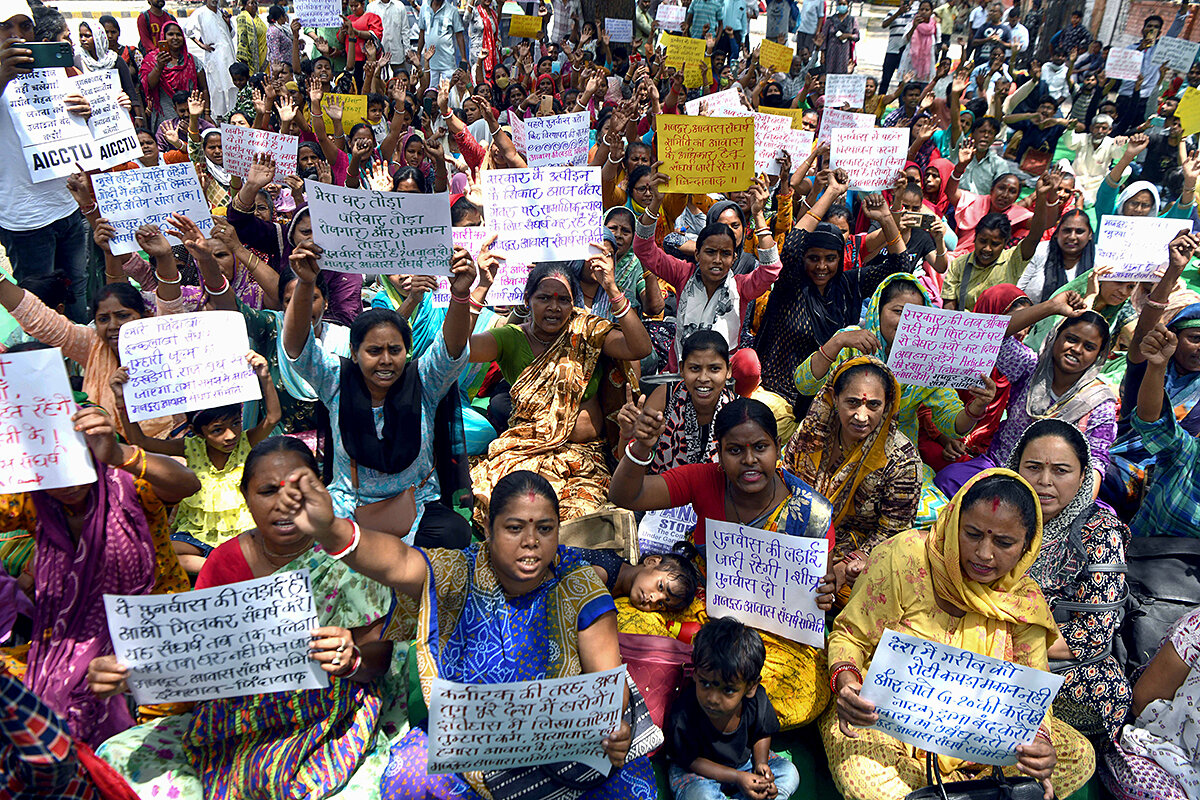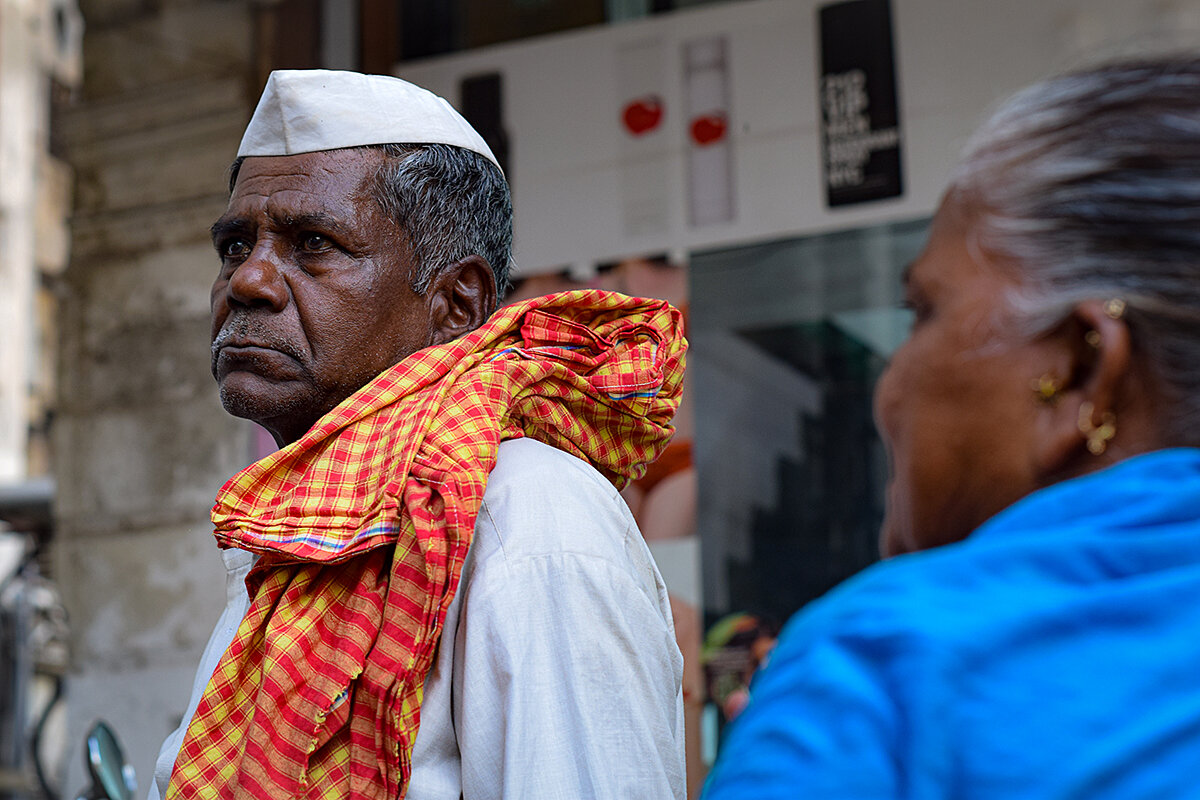G20 face-lift: Delhi removes poor people, but not poverty
Loading...
| Delhi
When officials and delegates arrive in Delhi for the G20 summit this weekend – marking the culmination of India’s yearlong presidency of the group of 20 leading nations – they will be treated to brand-new roads, lush greenways, and striking art installations.
But they won’t find Ayesha Sharma, a transgender woman who has survived by begging for the last seven years. One hot morning in April, Ms. Sharma had been begging for only a few minutes at a traffic signal in Delhi’s Dwarka neighborhood when six police officers arrived and detained her. A number of other trans persons were also detained at other traffic signals that day.
“No one gave us any clear answer why we were being detained until we were produced in court,” she says. “In court, we were told that ‘G20’ is going to take place in Delhi so all the beggars are being picked up. I asked what G20 is, but no one replied.”
Why We Wrote This
What makes a city dignified? Delhi’s push to get those begging off the streets ahead of the G20 summit may make for a more picturesque event, but it has made life even harder for the city’s poorest people.
Ms. Sharma is one of thousands of poor or destitute Delhi residents whose lives have been badly disrupted in the lead-up to the G20 summit, which is set for Sept. 9-10. As tulips were flown in and posters of Indian Prime Minister Narendra Modi went up, thousands of poor people in India’s capital have been displaced amid a strategic beautification drive. Experts say the face-lift has come at a hefty cost to the city’s most vulnerable people.
“This is not the first time the poor are being removed from sight ahead of an important international event,” says Indu Prakash Singh, a member of a Supreme Court-appointed committee that monitors homeless shelters in the capital. “The Indian government tries its best to hide its poverty, stripping the disadvantaged of dignity. They consider them an eyesore.”
In 2020, when then-U.S. President Donald Trump visited Mr. Modi’s home state of Gujarat, the authorities built a overnight along the road from the airport to hide poor people from the visitor’s sight. During the �����Ի���, thousands of poor people were left homeless in a similar beautification drive.
Earlier this year, as international officials held G20-related meetings in the port city of , those begging were evicted from the city and informal settlements were hidden behind huge tarpaulins.
In Delhi, an estimated 20,000 persons are engaged in begging, which has been decriminalized since 2018.
Since her arrest, however, Ms. Sharma has not dared to beg. “We were forced to take a pledge that if we were caught begging at a traffic signal, we would be responsible for our own fate and police can arrest us in any case” on trumped-up charges such as petty theft, she says.
Yet while thousands of beggars and homeless people are removed from Delhi’s streets and forcibly bused to the city limits, where they are dumped, hundreds of thousands more are added amid a spate of demolitions.
The most recent occurred on Aug. 24, when the Delhi Development Authority bulldozed around 150 homes in the Badarpur district on the outskirts of the city. In May, the research network Land Conflict Watch recorded a demolition drive in the Tughlakabad area that razed more than 1,000 buildings.
Officials, who have targeted 260 sites in the capital, say that the demolitions are part of an ongoing crackdown on illegal settlements, not the G20 beautification drive. However, watchdog groups say the uptick in demolitions reflects the city’s priorities.
“These are certainly the most widespread and large-scale demolitions that have taken place in the past decade,” says Mukta Joshi, a researcher with Land Conflict Watch. “In many cases, either no notice was served or short notice was given to victims with no plans of rehabilitation.”
Some beggars and displaced residents are being relocated to shelters on the outskirts of Delhi. But Mr. Singh says the authorities have given little thought as to how they will earn a living once they get there. “Often while removing the poor from the street, the government falsely claims that they are rehabilitating them,” he says. “But that rehabilitation is ill-planned.”
He also says the anti-begging push disrupts people who aren’t technically begging – like Bajrang and Mala, an older couple who have been living on Delhi’s streets since the 1970s when a drought in western Maharashtra forced them to migrate. They sell handmade crafts on a roadside in Connaught Place, in the heart of the city.
Indian law defines begging as soliciting or receiving alms in a public place, irrespective of any products or services offered in exchange. According to the law, even a can be rounded up if they appear not to have the means to sustain themselves.
Shortly before a Monitor correspondent met Bajrang and Mala, police had shooed them away from their spot.
While gathering their belongings, including tiny umbrellas handmade from colorful thread, Mala – who like her husband and many people in India goes by one name – complains about “this ruckus” that the G20 has brought.
“We get fed up every time the police ask us to move,” says Mala, who is partially blind and cannot walk without support.
“It is a very misplaced notion that people like Bajrang and Mala are beggars,” says Mr. Singh. “They are poor [people] who do not have the means to set up a shop. Where will they go? Onto the streets.”
“Removing the poor will not make Delhi beautiful,” says Bajrang. “Removing poverty will.”









